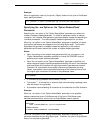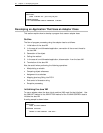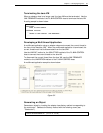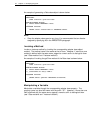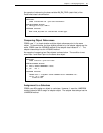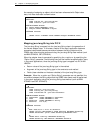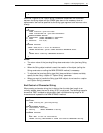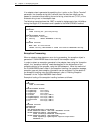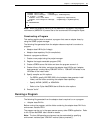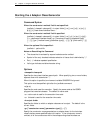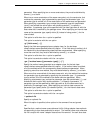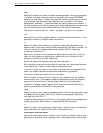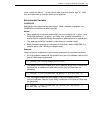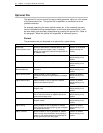
Chapter 3. Developing Programs 29
DISPLAY "Error Code: " errCode.
DISPLAY "Error Message: " errMessage(1:errMessageLen).
IF rc NOT = -1 THEN
DISPLAY "Java Class Name: " expClass(1:expClassLen)
DISPLAY "Java Exception Message: " expMessage(1:expMessageLen)
END-IF.
END DECLARATIVES.
…
Note: When the exception handling is not described in a program, the program
runtime error (JMP0104I-U) occurs due to the occurrence of the exception object.
Constructing a Program
This section explains how to construct a program that uses an adapter class, by
using the COBOL project manager.
The following files generated from the adapter class are required to construct a
program:
• Adapter class LIB file (for linkage)
• Adapter class repository file (for compilation)
Construct a program as follows:
1. Create a new project using the project manager.
2. Register the target executable program (EXE).
3. Create a COBOL source file folder and store the program source in it.
4. Create a library file folder, and store the adapter class LIB file and J adapter
class generator runtime library F3BIJART.LIB in it. F3BIJART.LIB exists in the
LIB folder of the install folder.
5. Specify compiler and link options:
- For REPIN, specify XXX\REP (XXX is the J adapter class generator install
folder) and the folder containing the adapter class repository.
- Specify ALPHAL (WORD) or NOALPHAL.
- Refer to the
Fujitsu NetCOBOL User's Guide
for other options.
6. Execute "
build
."
Running a Program
The following file generated from the adapter class is required to run a program:
• Adapter class DLL file
Before running the program, add the folder containing the adapter class DLL file to
environment variable PATH.
The program can be run in the same manner as any other COBOL application. Refer
to the
Fujitsu NetCOBOL User's Guide
for details.
Note: The Java VM operating environment can be customized by specifying
environment variables (see ”JVM-INIT method (factory method)”).



